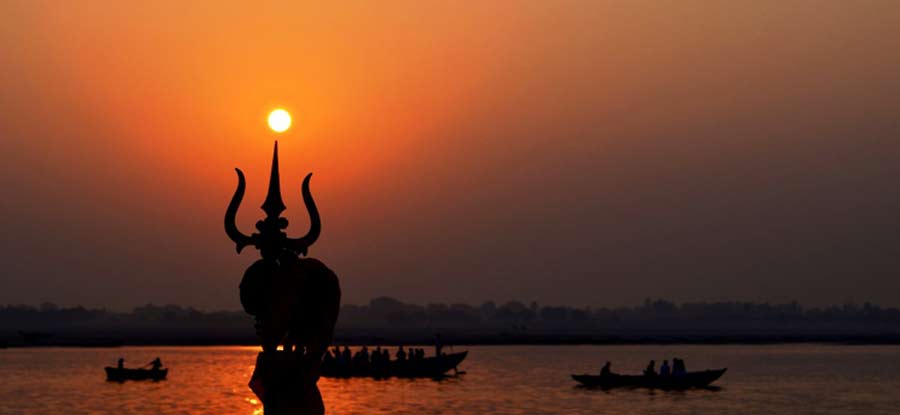
Varanasi at sunrise
Editor’s Note:
Dr. Mark Dyczkowski is one of the world’s foremost scholars on Tantra and Kashmiri Trika Shaivism and has lived and worked in India for close to forty
years. Both a scholar and a practitioner, he was initiated by the great Indian teacher Swami Laksmanjoo in the year 1976. He has an undergraduate degree
from Banaras Hindu University and a Ph.D. from Oxford University, where he researched Kashmir Shaivism under the guidance of Professor Alexis Sanderson.
Mark has published extensively including the 12 volume Manthanabhairava Tantra and is considered to be one of the world’s leading authorities on
Tantric Shaivism.
Lea Horvatic:
How did you find yourself on path of Tantra and Kashmiri Trika Shaivism? When did you discover it, and what events and people were instrumental in that
process?
Mark Dyczkowski:
I went to India when I was 18. I grew up in central London, and in the mid 60’s there was a boom of interest in all things Oriental – and although it was
a passing fashion at the time, it left a lasting impression on me. A few people like me went to India. I came overland in 1969. When I arrived to Delhi, I
was taken to an ashram of a young guru, called Maharaji, who was 12 years old at the time. I spent 6 months in that ashram, and had quite a transformative
time.
I returned to India in 1970, and enrolled the University in Benares. Before that, I met Nik Douglas, who in 1970 published a book called ‘Tantra Yoga’
illustrated with great photographs with tantric themes, cremation grounds, yogis sitting meditating, and this drew me to Tantra. Then in 1971 I met Pandit
Hemant Chakravarti, my first Sanskrit teacher, and my learning began.
India for me fed my spiritual needs and my thirst for learning, art and esthetics, and it still does.
I did a couple of degrees in Benares University, came back to England in 1974 and did a PhD in 1978/79 which resulted in the first book, The Doctrine of
Vibration. I hated that, I didn’t think that was a good PhD at all, but now it seems that the 10’s of thousands or even maybe a 100000 people read it by
now.
I did not know this at the time, but Muktananda and his people liked it very much, and they promoted it, as well as my other books. I found this out only
about 10 years ago.
I love India! I have India sickness. I can’t live anywhere else but here, not for long at least. It can be tough at the time, but it is worth it – for it
is India. This is where I want to die one day.
I have been here since I was 19 – I went back for four years to Oxford, and I travel sometimes, but I have spent most of my time here, reading and writing,
practicing and learning sitar, playing sitar. Everything has guided my life, Lord Shiva is manifest around as all there is, people come and I teach a
couple times a week from my house, and I teach in Europe and USA…. The rest of the time, I am here.
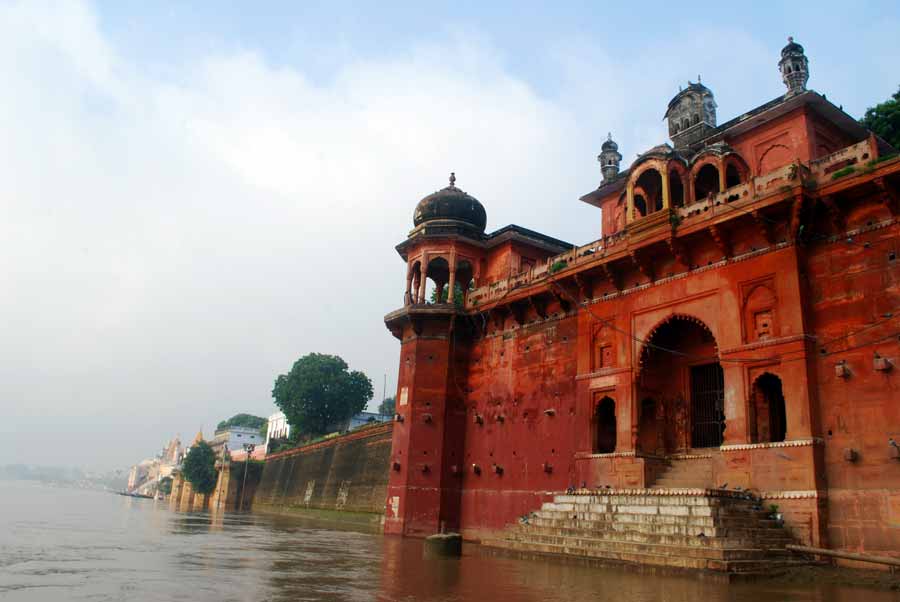
Ahilya Ghat, Varanasi at Sunrise
Lea Horvatic:
You are one of the world’s leading authorities on the subject. What led you to formalize your practice and study through academia? Who were your most
memorable teachers there?
Mark Dyczkowski:
Back in the 70’s there was still a lot of people with the knowledge here in India, that has really become a rarity since then, Benares used to be called
Oxford of India. Nowadays, that has changed, the best Indian minds go into study of computer programming, engineering and medicine today.
But at the time, I spent each day learning and meditating. I met the great Gopinath Kaviraj. I had very good music teachers, one of whom was Dr. Gangade.
Very good Sanskrit teachers. Hemant Chakravarti started me in 1971, reading Kashmiri Shaiva texts.
When I went to Oxford I was very fortunate to study with Alexis Sanderson, I kept contact with him for some years.
My Guru, Swami Lakshmanjoo, I met in 1976 and took initiation with him. I used to spend 6 months at the time with him. I was very impressed by the way that
he talked. As a scholar, I do understand, there is a certain criteria as to how we communicate – we have to be very accurate, very precise, we have to pay
much attention to detail; if you have personal insights, you ought to single them and not include them into your research. But SwamiJi had a beautiful way
of presenting something that was so innate to him. I was 25 then, and that made a deep impression on me. He was one of the people that I always modeled
myself on. When I teach, I try to look into my heart, and I try to open other people’s hearts. On one side I write the books to help preserve the
tradition. Now Tantraloka is coming out – it is quite heavy, very long, with many technical details… but on the other side I talk, explain verbally – the
oral explanation is about one’s practice and one’s personal experiences, which is what the texts are about anyway.
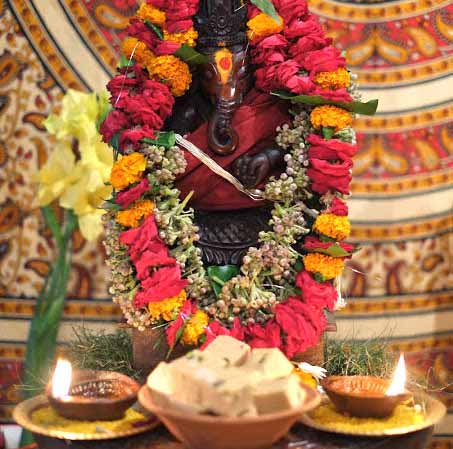
courtesy of anuttaratrikakula.org
I think both ways are necessary, and in India all these teachings – Veda, Vedanta, Samkhya, Mimamsa… these are traditions, the religious spiritual
traditions, but at the same time they are the learned, philosophical ones.
It is very surprising, or maybe not, that for most seekers, the esoteric traditions are the most complex.
When I was 14 I was reading Walter Evans-Wentz, the Tibetan book of the Dead and Tibetan Yoga secret Doctrines. They are very complex,
very deep, and to understand them you would have to spend a lot of time, many years of practice and deep reflection. Such secret traditions are for very
few. Because people need to be so totally dedicated, they invest their lives. This can’t happen on a mass-scale. So what happens is that some, a few who
are dedicated enough become the repository of tradition, they teach others, they give out what they can, or rather people receive what they can, and the
passion of those people is also to be transmitters of that tradition – the tradition is alive when it’s inside of somebody, not when it’s in books. In one
way people will respect a guru…. I am not a guru, in a sense, I am not a guru going around and giving initiations to people, I would not have time to do
what I am doing if I was to do that, and I was not told by my guru to do that. Thank God. I would not be able to sit in the chair while people worship me –
I would find it terribly embarrassing! I wouldn’t be able to cope with that – it would give me a lot of ego, embarrass me, it would damage me a lot – I
can’t do it – I am too self-conscious. I like to be friends with people, that is ok.
Another function that a teacher had, let’s not call him a Guru, is to be a repository of Tradition, If there weren’t for people like me, and I am not the
only one, the Kashmiri Shaivism wouldn’t exist – yes it would – but it would exist in very diluted, very superficial form, which wouldn’t be enough. Like
in Christianity – going to church on Sunday IS Christianity – with a Vicar up there, reading psalms…. If Kashimiri Shaivism was to be reduced to something
– boring like that - if there wasn’t for few people who spend their whole lives receiving the Tradition… so the sheer existence of people like me, preserve
it. On the one hand, that requires not just a lot of studying and learning and applying yourself to it, but dedication, staying with it. I find that in
people who come and study with me over the years, a very few have what for me it was very natural from the beginning, just that one-pointedness… I find
that quite rare, very surprisingly. I never looked left or right, I just walked straight into it – from one to next – so I finished my PhD when I was 28 as
when one normally would, and done things in more or less sequential manner, on largely same trajectory.
Still, that is not at all necessary for people who want to practice Kashmiri Shaivism, and for people to get benefit from its teachings. Now, people go
about very many different things in life, things that they need and things that they do, different aptitudes…
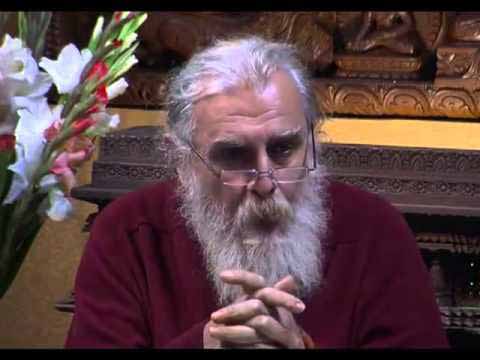
Mark Dyczkowski, courtesy of anuttaratrikakula.org
Lea Horvatic:
You were blessed with experience of study with the last living Master of the Kashmiri tradition. What was that like?
Mark Dyczkowski:
My experience of study with SwamiJi (Swami Lakshmanjoo) was that he was my greatest inspiration, my whole life was modeled on that.
On the subject of ‘experience’, something comes to mind, so I will digress a little. From the age of 14 to 19-20, those years before I came to India for
the first time, I had amazingly powerful spiritual experiences. I was flying – my goodness – when I look back on that, it was like a window had opened, and
I was flown to a goal. And for the rest of my life, I had that as an example, an inspiration. So you see, the experience is something that is not a guide
of development, in fact in the beginning you may have many more experiences than people who are very advanced have. I often meet people who tell me this
happened to them or that, and when I ask them how long they’ve been in this, and they say ‘oh, three or four years..’ and their mind is overwhelmed with
what they are experiencing, it’s all they are thinking about.
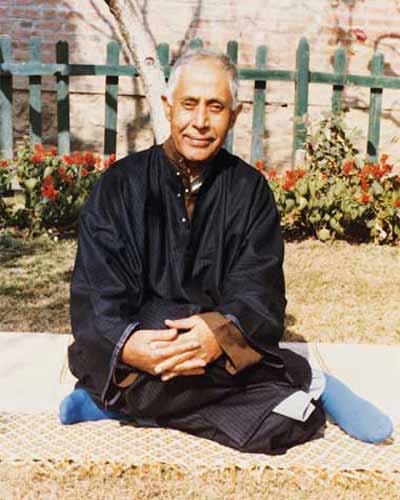
Swami Lakshmanjoo,
courtesy of universalshaivafellowship.org
And it is like that when you are a baby – for a child, everything is very intense! What is very ordinary and boring when you are an adult, for a child is
mindblowing! When you begin on the path, you go through a lot – He or She – they want to encourage you very much – it is like when you are a baby, you
don’t do anything - your mother treats you, she breastfeeds you, she dresses you, she washes you, picks you up, puts you down, does everything possible to
make you as happy and as comfortable as can be. And when you grow up a little, you need to start walking and eating for yourself – doing things for
yourself. At the beginning you have a lot of experiences! Of course, everybody is different…
But when you have a lot of experiences, often there is a lot of ego. People say it fosters pride. That is what is rather annoying about it. But it is not
always so. Sometimes people are very humbled by things they are experiencing. What I’ve seen, in my short time of teaching people, and not many, for I
haven’t got huge crowds of thousands coming in for darshan - I am lightyears away from that, nothing like that - but I do see that 3-4 out of not many, for
which those are truly transformative in their lives. You see, that is what moves me, I am inspired by what happens to them. You know Rumi, when his guru
Shams flew, Rumi was very heartbroken, and when he finally accepted that he will not see his guru again, he thought he should adopt a guru. And so he chose
his best disciple to be his Guru. So that is how I feel about one or two of my students. They don’t feel like that at all, that they are my Guru….
You see, if you find God in any way, you are very fortunate – it is not just experiences, but your life changes, the way you live your life, the way you
look at things, your daily life changes, your needs and desires change – you think with clarity, you find a direction. These are the kind of things that I
find significant. When I hear just about ‘experiences’, someone experiencing this or that, I don’t know how to deal with that and I do not think that is
important, not really. What it inspires you to do, that is important. If you are having kundalini experiences, is it changing your life, is it giving you
anything at all, is it giving you an ideal, is it giving you something to live for? A reason for your life, that is what is needed, isn’t it? What makes
living worthwhile, the efforts that you make, the daily sacrifices we all have to make all the time, all the difficulties we all have to go through, than
it is worth going through them for this. When people say such things to me, than this is moving and significant.
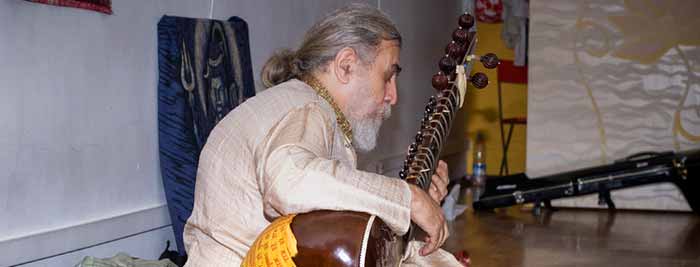
Mark Dyczkowski, courtesy of anuttaratrikakula.org
Now Kashmiri Shaivism was like that for me. SwamiJi and other people - when I look back on life I see that they were models that inspired me to follow in
their steps. So all this hard work, and everybody I know work hard, I am not alone in that – but all that hard work was worthwhile. For me. This is what I
think is most important about the people I met early on in my life, people like Sanderson, like Gopinath Kaviraj, my Sanskrit teachers… they were all very
inspiring – their knowledge, their sensitivity…. The clarity of thought that comes to learning, the musicians- teachers who played wonderfully, their music
was so inspiring, they taught me a lot about beauty and how to look for it around me and within me… how far I managed to achieve that and find that, is a
different thing, but it clarified to me what I thought to be worthwhile, is worth living for, why I am alive and what I am alive for.
So it is really just that simple.
You see, people wrote about the secret traditions and esoteric traditions – but they didn’t live it, it was in their imagination. And they had wonderful
imaginations, no doubt!
But when you live it, it is not glamorous, well it is glamorous – it is interesting, inspiring and wonderful, but it is just fact of existence.
When I look around, I wonder who is prepared to do that – to get the secrets, to learn that – you have to pay the price - for me to do that, I lost my
kidney, I damaged my health, and so on, even if the Goddess wanted me to do all that – even came once in a very powerful experience, the only really strong
one after my young years… still, I had to pay the price.
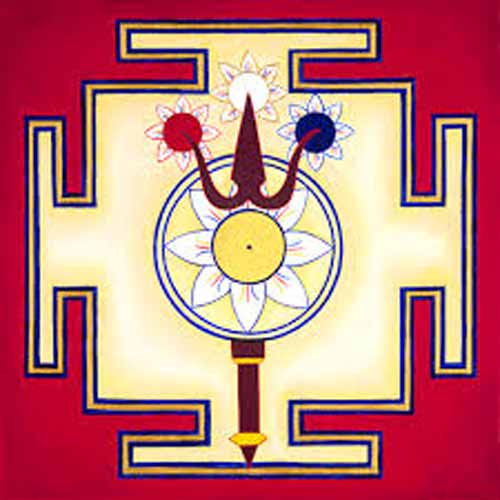
Trika, courtesy of anuttaratrikakula.org
Lea Horvatic:
Aside from your academic proves, you are widely revered as an accomplished sitar player, and you still give raga performances, not only in Varanasi, where
you live, but worldwide. Could you tell us more about your love for this instrument?
Mark Dyczkowski:
What I teach people, and what is when we sit in meditations, that I call the ‘body’, and the music I call the ‘soul’. I find it’s easier for people to
understand, as they know me less as a musician and more as an expert in these secret things – what I think and what I tell them is that if you cannot sit
and be absorbed in music, in silence, in stillness, it is going to be very difficult for you to understand the teachings.
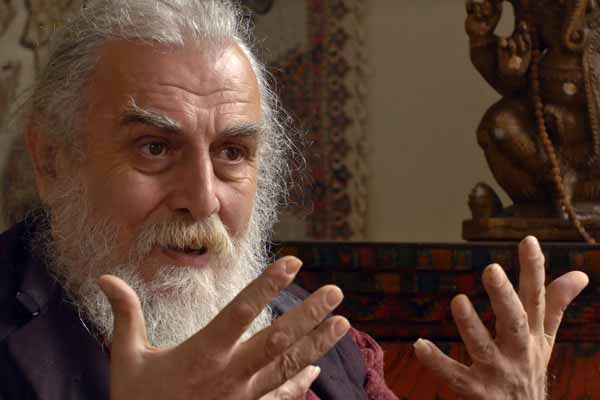
Mark, courtesy of anuttaratrikakula.org
Lea Horvatic:
Tell us more about your love affair with India. You’ve been living in India almost continuously for over 40 years now. What is it about its people, lands
and culture that holds your heart so?
Mark Dyczkowski:
My love affair with India has been a constant falling in love. Once you’ve fallen in love, there is an art of staying in love to be learned, rather than
just making it an exercise in fidelity.
If you stay married, it is almost a miracle. It happens or not. But part of that is making sacrifices, and allowing the other person to do what they want
to do and to be what they are and who they are. And that happens with India – India is as it is, there is good and bad, this is true. Like the world. And
it is such a wonderful place for those who love it, because in India you are free to do what you want to do. And to be as you want to be. People say that
living in Benares is glamorous. But it can be quite trying. Especially here in India – it is very humbling. I think all of life, part of what we learn is
learning to be humble. I do not recommend it to anyone. I’ve always felt of not belonging anywhere, that is common in lot of people nowadays, but the sense
of belonging can go through all levels of your being.
There is a kind of inner India, and it is that that we love, we live, experience and see…. Why is it fascinating? Well, it IS fascinating! It has
fascinated all the people through the millennia who came here, people on the other side of the world – it fascinated the Greeks, the Romans, the English,
the Muslims, Chinese travelers, the Tibetans who came here… they used to say that India was the Light of the World… they don’t say that today anymore
because of the nationalism. They used Christian idiom which Sri Aurobindo was very familiar with. Aurobindo used the same expression, by the extension of
what Sir Edwin Arnold used to call Buddha the ‘Light of Asia’. And it was like that in the 60’s, 70’s and into the 80’s… and then because of this
nationalism now, they put the stop to that. They want to keep the Hinduism to themselves. They do not like to have those millions of non-indian hindus
around the world… But this is the Indian light that illumines them, the non-Indians - it is the Hindu light, the Buddhist light, the Light of Asia…. So
that was not so clear in the 60’s and 70’s, and now that the nationalism has come up, and wanted to hindu-ise the insight religion, the spirituality, those
same which we were told in 60’s and 70’s that they were Truths, without being of a particular creed, or nation.
This Light illumines me and so many other people, and we walk by that Light.
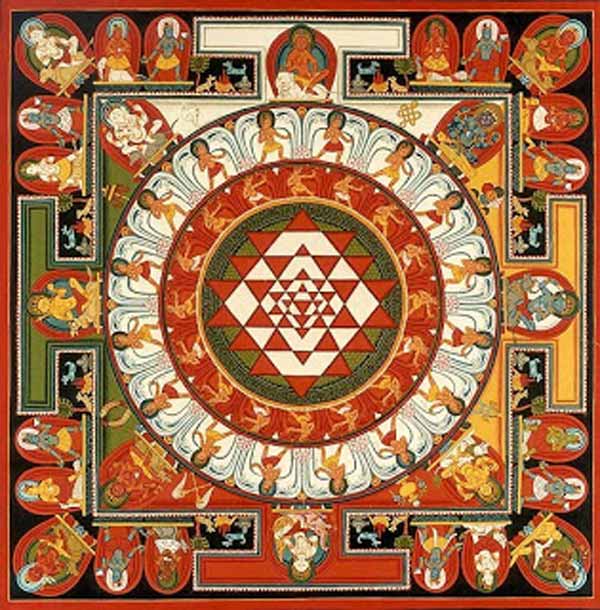
Sri Yantra Shiva Shakti
Lea Horvatic:
You have written a number of books on the subject of Tantra and Kashmiri Trika Shaivism. What can be said here to explain the deep vastness and profundity
of this tradition, and the Kubjika aspect of it?
Mark Dyczkowski:
Kubjika, the Goddess Kubjika, you can quite understand that the person who is interested in Tantra, who is profoundly involved in tantrism, wants to
study, wants to learn and discover a very secret Tantra – not all tantras are a hidden secret… So the type of tantras most of us can think of would be out
of a secret tradition. In Nepal, Kathmandu valley, they preserve Tantric traditions that go back thousands of years, and the deities and the manner in
which they are worshiped, even if it is in their own local colour, is very much as it was thousands of years ago. And out of all different forms of
tantrism or non-tantric religions that they could have chosen, they’d consider the most secret traditions to be the most excellent. As the Tibetans did
with their Buddhism. I first learned from the manuscripts. You see when I got married Sanderson gave me two manuscripts for wedding present. One of them
was Kubjika tantra, so that intrigued me – that was a small seed. So when I went to Nepal, I used to go once, twice, three times a year for many
years, to cut the long story short, I discovered that the Goddess was still being worshipped, in a very secret manner, and that there is a whole secret
society in Kathmandu valley which has been in place for centuries. They all worship many different power Goddesses – to secure and enhance their daily
lives, and out of all those power Goddesses, Kubjika is the most powerful and she powers all the others. I found that fascinating and profound, and it
involved me very deeply. She took hold of me one day, I had a very powerful vision, and with it she told me that I should do this. So like that, I worked
very hard for ten years and produced these 14 volumes, involving 600 000 references and cross-references… amazing how helpful the people were – typing,
collating manuscripts… huge work… within a month of its publication, I was operated on and I lost a kidney… it is ok, the other one is alright – and even
though the Goddess told me to do it, and my guru and my family were also convinced that I need to do it, even so – I still had to pay a price – She has
been kept so secret for so many centuries, only a small number even knew that she existed. I had to pay some price. But I am still here. The other kidney
is alright, let’s see if that shortens my life or not…
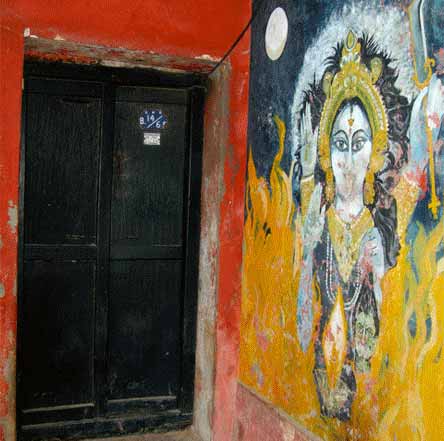
courtesy of anuttaratrikakula.org
Lea Horvatic:
Anuttara Trika Kula, an ever widening group of practitioners who thrive under your guidance. Could you please tell us more about this informal setting of
which you are a part of and its leading light?
Mark Dyczkowski:
I have a website – there is about 500-600 hours of lessons that still need to be uploaded, a huge backlog – we hope to have about a 100 to 200 hours
free, and the rest are to be given in packages at a very nominal price. It started off as Tanatraloka project, which is very advanced, but what I
want is to create the resource where people can download from material and get benefit of it, no matter what level of understanding they are on. So now we
are developing smaller packages, and introductory courses also. But you see, my time is limited, and I keep hoping that students would turn up, or
volunteers who’d help with that. So my students help when they are not busy themselves. The website exists entirely because of their work, they help a lot.
So, how much impact is it making on people out there? You see, people come here when they are in India. If I were in London, or anywhere else in Europe, or
NY, or San Francisco, it would be much easier for them to regularly visit, and there would be a regular pool. Like this, I have a group of students who
visit fairly regularly, and keep coming back here year after year, not only because of me, they come to India, it is all part of their life… but there are
many more that come once or twice, stay a few days, then move on, and others yet who I never met, they are out there somewhere, downloading the lectures
and books - or others still that I see in workshops in Europe perhaps.
Because I am a foreigner, I can’t really start an ashram here. There are those who have tried, and it always ended in disaster, and being thrown out of
India. I can’t risk that. So I can’t give people a place to stay and a regular program. Which is what people need. I had that. As it is now, I have my
regular life, and people who come to see get accommodation near here, stay a month or two, perhaps more if they can – but I can’t do more than say come two
three times a week for a lesson, and some would like to come for a concert, and we have a class, and some meditation and mantra chanting. But when you go
to an ashram, let’s say in Thailand, or America, Australia, Bali or somewhere else, you have 300 to 500 people living there, the whole lot of instructors,
that is like running a luxury hotel! I am being cynical here now, but just looking from the point of view of administration and such, it is a huge
operation. And whatever may be your good motives there, although perhaps you may be seeing it as just business, even with the best of motives, it has to be
your whole life’s work. Which I am afraid mine can’t be. My life’s work is to receive as much of the tradition as possible, to give it out as I can, and to
practice. That is my job.
But at the same time, people do come back to me, saying that they are grateful, that they’ve received something from these teachings. I see that beyond
some point, I can’t do more. I have a reason to do what I am doing. The only thing I want and crave in life is the Indian visa. So that’s why the books are
being written, as they give me a student research visa. I worked out that that is the only reason I do it. (mocking) But teaching people is something I
have in debt. From my gurus. They sat with me on one to one basis. In those days it was like that. I used to go every day to two or three teachers, one or
two hours with each, for months and years together. I benefitted from something that nowadays has become very rare. I don’t know whether those days will
come back ever again. There just aren’t the people anymore. There are hundreds of thousands of people who can teach yoga, meditation, massage, Ayurveda and
all of those things, but there are a few who can teach shastras. This is very rare. And fortunately most people don’t give a hoot about the shastras – that
is rather fortunate, otherwise I sitting here would be very crowded! (jokingly)
So it is very good that there are only a very few who are interested, because there is only a very few who can teach those very few. If more people
understood what this is, I don’t know what I would do, I would have to run away! (mocking)
What is a prerequisite to profound understanding is something that you can only know by experiencing it. Depth of insight. The experience of the depth of
insight. You see, in classical music or any great music, Mozart, Beach Boys. In the higher anutara yoga tantras, in Buddhists, they have a thing called
‘inspiration through hearing’ and that comes just from hearing the teachings. Now you say, ok, so they have to be delivered by an enlightened soul. Well,
if you don’t think I’m enlightened, then you’ll never think yourself to be enlightened. People think that I am enlightened when I don’t believe that. I
have one or two students, and I am talking about literally one or two, who think that I am far beyond what I think I am…. You see what I am saying? So this
is a contradiction. I don’t know how spiritually developed I am! I may be much more developed than I think I am, or much less developed than I think I am!
What matters in not how spiritually developed I am, but how spiritually developed you are. If you come to somebody, ok it is important that this person
should not be crassly immoral and be cheating you trying to get you in their bed or using you somehow, obviously. But beyond that - you see even when some
people give you a shaktipat, and you sit with this person, and you feel blissful, all right? Even with such a person what will matter is how you are. We
sat with Swami Lakshmanjoo and other people and experienced this immense shaktipat. But he is not here now. Can you see what I am saying? In the same way,
the point is not how far advanced I am, it is how far advanced you are. Ok, so you wish to sit at the feet of a living master, ok do that, that is fine,
but if you come here to meet me, you are not going to come to sit at the feet of a living master. You come here like when you come to a temple – you take a
bath in Ganga, it’s a moment to sit down and experience deeper realities, contemplate them, meditate on them, look deeply within yourself, try and seek
your real identity. Have an hour or two where you are engaged in doing that. That’s all. Ok, I happen to be the other person, talking, but I am nothing, I
am just an image in your mind. Especially here where people come, stay a few days and then leave. I see them again maybe one year later, or two years
later, maybe never again. I am just a dream, an image, nobody knows me.
There is a little anecdote I’d like to finish with here. I was invited a couple of years ago to a World Yoga Conference that was down at Satyananda ashram,
in Bihar. So there was a crowd of about 15 000 people sitting there. They have all been taught, talked to by so many people, sannyasins, gurus, the Guru
himself, and then they said it was my time to speak. Well I don’t really …. my tradition is from my Guru, each one of us have their way, and in our
tradition, we do not have all this sannyasins and all that, and the guru doesn’t wave his finger at students all the time telling them that they should be
better sannyasins or good sannyasins, be more disciplined or things like that, which is what they were being told for the previous three days. So I sat
down, and I thought to myself, it is not in my nature to speak in that way, and then very nervously and tentatively I looked around - the gurus sitting
there, and they sort of nodded at me to go ahead, and I said: “You know, when I look at you,” and suddenly I was very moved, I suddenly felt those 15 000
Lord Shivas sitting there, Shivas inside, you know, I got this profound feeling, I felt sort of great love for them all, in that moment, and I said, “You
think how humble Lord Shiva is, how great He is, because of His humility, that He becomes so imperfect, so impure, so lost, in such pain, so completely
undisciplined, that he becomes every one of us. We are all Lord Shiva, and His greatness is in His humility to be you and me.” Or something like that. And
I looked around and at the Guru, and I thought - I hope I made sense with that… But you know, a silence fell that astonished me, and it lasted for what
seemed a whole minute, and then everybody just clapped. So I thought - good, that went the right way!
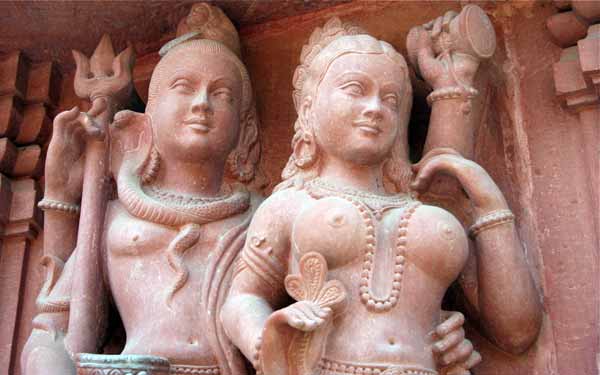
Shiva and Parvati, by Nagarjun Kandukuru, Bangalore, India
And spiritual life is like that – however bad and backward you are, however human, and full of faults, undisciplined, whatever – or the other way around –
it is a very personal affair – where you are, and how far you got, you don’t know… I talk to people like this, this is what I would like to hear from
others. I met many people, hundreds of people, who’s whole life is nothing but God. They live it 24 hours a day, awake and asleep, absorbed in God. From
meeting such people, and hundreds of them, I can tell you that they are very ordinary. In a sense, they can be mean-minded, they can be petty, they can
quarrel, they have their ego, their jealousies, their envies - just like everybody else, and they have their special moments with God, but also a lot of
their life is an eternal struggle, as it is for everybody else. In fact, if the spiritual life is so blissful and easy one, then why are so few people
living it?! All this ‘bliss bliss bliss’ you keep hearing about, if it was all so wonderful, we would all be such great yogis – meditating, doing puja, and
whatever one is doing to brings us close to God, but we don’t, or very few do, because it is actually much harder to live a spiritual life, than a worldly
life, and God knows how tough the worldly life is! In one way.
But in another way, living a spiritual life has a kind of subtle joy, kind of depth, a kind of meaning to life, that if you don’t have that, that spiritual
dimension to your life, you would feel that you are missing a piece.
In the end, Ramakrishna put it quite nicely, and if it wasn’t like that, we would not have a hope in hell – that every step we take towards God, He makes a
thousand toward us. And if it wasn’t like that, than nobody would have a hope in hell! And I am just like everybody else, I am no better, you meet me like
you would anybody else – ok I learned all these things and so on, yet I am not saying that is a good thing – you may say that is a sign of my backwardness
perhaps, I do not know, but that is just how it is, and it is not going to change much – I am 64 now. Let’s be honest!
You know, the one or two people who are enlightened, for the Jains believe that there hasn’t been an enlightened person in the past 2500 years - I think
that is a bit of an exaggeration, but is not far from the truth, it is very rare, and even if they are enlightened, of course that helps the living world
immensely, but only to the degree in which we ourselves are inspired by it.

God is a very ordinary person at one level, as much as He is an infinite being beyond that which is beyond anything that you can imagine as to just how
extraordinary He is - and She is. So I tell them in the lessons, we talk about the Oneness of God, and his infinite Light, but then by Her or His Grace, we
catch glimpses of it – even in the midst of all this heavy karma, all these things which are pulling us to the left and to the right, that is all. So being
a receptacle of a tradition, a recipient of a tradition, and one of the tradition holders, is a matter of knowing a tradition, respecting it profoundly,
and doing to some extent your duty of transmitting it to others the best you can, to the level and in the way you can, that is all I can do. If I were very
much more elevated than it appears to be, perhaps I could do a better job! I would have billions of followers, they would all be enlightened, and the whole
world would be transformed, and instead of all shouting “Muktananda” they would all be shouting “Mark!” (mocking)
They would be getting a lot of bliss from that – but I can’t manage that, people come and get what they do, and I am happy and glad that they do, and Lord
Shiva is graced. Hey Bhagavan!
There are a lot of people who love God, who live spiritual lives, let’s think about those simple people first, I feel fortunate to have known a simple soul
like that, who was mostly perfect, at least aspired to be with God, to have God in his life– that is already a lot, at least in this terrible Kali yug that
we are living in! (laughs)